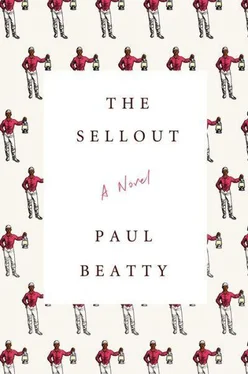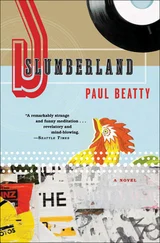I hadn’t seen Panache in years. I didn’t know if he knew Marpessa and I were sleeping together. I never asked for permission. But seeing him do his signature stage tricks with Lulu Belle, his pump-action twelve-gauge equivalent to B. B. King’s guitar, which, considering that like some criminal-minded baton twirler he could throw high in the air, catch, reload, and blast a hubcap out of the air like a clay pigeon, all with one hand, maybe I should’ve. King Cuz yelled into the microphone, “I know at least one you niggers had to have brought some Chinese food!”
Two dudes, whom the police, and anyone else with a Street Smart IQ of 50, might refer to as “suspicious Hispanic males,” stood at the first-base line just outside the festivities, their arms folded across their chests. Although they looked, more or less, like everyone else at the park, from the way they eyed everyone with such disdain, it was hard to tell if they were from Dickens. Like Nazis at a Ku Klux Klan rally, they were comfortable ideologically, but not in terms of corporate culture. Word spread that they were from Polynesian Gardens. Nevertheless, the irresistible smell of hickory-smoked barbecue and the cloud of dank billowed over them, drawing the duo farther and farther into the infield. When the men arrived at the on-deck circle, Stevie, who was slicing the pineapples with a machete, asked, “You know them niggers?” Never taking his eyes off the two homies as they made their way down the dugout steps. Both dudes wore khakis whose baggy leggings spilled over two pairs of Nike Cortez sneakers so fucking new that if they had taken one shoe off and placed it to their ear like a conch shell, they’d hear the roar of an ocean of sweatshop labor. Stevie exchanged prison stares with the guy in the bucket hat, football jersey, and Stomper stenciled along his jawline. In the hood men don’t wear sporting-club jerseys because they’re fans of a certain team. The color, the logo, the jersey numbers all mean something gang-related.
When you’re fresh out of lockup everything is racial. It’s not like there aren’t Mexicans in predominantly black Crip and Blood sets, and blacks in mostly Latino cliques. After all, on the street it’s all proximity and propinquity. Your alliance is to the homies and to the hood, regardless of race. Something happens to the identity politics in prison. Maybe it’s like movies where it’s white versus black versus Mexican versus white, no ifs, ands, or buts, and I do hear tell of some hardcore, color-blind thugs who roll into lockup and dance with the niggers or the vatos who brung ’em. Fuck La Raza. Chinga black power. This nigger’s mother used to feed me when I was hungry, so later for the stupid shit.
The fool in the ice-cap-white T-shirt and Puppet tattooed vertically down his gullet nodded to me first.
“¿Qué te pasa, pelón?”
Us fellow baldheads don’t share in all the racial animosity. We’ve come to accept that, regardless of race, all newborn babies look Mexican, and all baldheaded men look black, more or less. I offered him a hit of my joint. His ears turned deep red and his eyes glazed over like Japanese lacquerware.
“What the fuck is this, dog?” Puppet coughed.
“I call it Carpal Tunnel. Go ahead, try to make a fist.”
Puppet tried to ball his hand, but failed. Stomper looked at him like he was crazy, then angrily took the joint from his hand. I didn’t need a program to tell me that despite appearances, Puppet and Stomper weren’t on the same side. After a long puff, Stomper twisted his fingers into all sorts of dexterous gang signs, but he couldn’t knuckle up no matter how hard he tried. He removed his nickel-plated gat from his waistband. He could barely grip the gun, much less pull the trigger. Stevie laughed, and it was cold pineapple slices all around. The homeboys took bites, and the unexpected surge of sweetness with a slightly minty finish caused them to wince and giggle like little kids. Then to the hard glares of the other hoodlums, the two cholos walked into deep center field, calmly scarfing down pineapple and sharing the last of the marijuana.
“You know that NK on Johnny Unitas’s neck don’t stand for ‘Nice Kid’?”
“I know what it stands for.”
“Stands for Nigger Killer. Both them niggers from different sets, though. Barrio P.G. and Varrio P.G. Not like them to be chilling like that.”
Hominy and I shared a smile. Maybe the signs that we’d posted in Polynesian Gardens on the way home from the hospital job were working. We’d made two signs. Hammered them into two telephone poles on opposites sides of Baker Street, where the rusted train tracks divided the neighborhood between Varrio and Barrio P.G. We placed them in such a way that if folks on one side of the street wanted to know what the sign on their side said, they’d have to cross the tracks to read it. So they had to venture into enemy territory, only to discover that the sign on the north side of the street was exactly the same as the one on the south; they both read THE RIGHT SIDE OF THE TRACKS.
Marpessa pulled me out of the dugout and toward home plate. King Cuz and a delegation of aging thugs and wannabes were standing in the batter boxes, grubbing on ribs and pineapple. Panache was chewing his pineapple slice down to the rind, telling stories about a musician’s life on the road, when Marpessa interrupted him.
“I just want you to know I’m fucking Bonbon.”
Oblivious to the thorns, Panache stuck what remained of the pineapple, skin and all, into his mouth, slurping and sucking out every last drop of juice. When the fruit was dry as a desert bone, he walked up to me, tapped my chest with the tip of Lulu Belle’s barrel, and said, “Shit, if I could get some of this pineapple every morning, I’d fuck the nigger, too.”
A gunshot rang out. In center field, Stomper, apparently still feeling the effects of the Carpal Tunnel, was barefoot, lying on his back, aiming the gun with his feet, laughing his ass off and shooting with his toes at the clouds. It looked like fun, so most of the men and a few women went to join him, puffing on their joints, weapons out, and hopping through the dirt infield, one shoe on, one shoe off, hoping to spark a few rounds before the cops came.
Black people pop. “Pop” being Hollywood slang for having a dynamic camera presence, for being almost too photogenic. Hominy says it’s why they rarely shoot black and white buddy movies anymore; the bigger stars get washed out. Tony Curtis. Nick Nolte. Ethan Hawke does a film with some African-American and it becomes a screen test to see who’s really the Invisible Man. And has there ever been a buddy movie featuring a black woman and anyone? The only ones with the cinematic magnetism to hang were Gene Wilder and Spanky McFarland. Anyone else — Tommy Lee Jones, Mark Wahlberg, Tim Robbins — is just hanging on to the mane of a runaway horse.
Watching Hominy at the L.A. Festival of Forbidden Cinema and Unabashedly Racist Animation, on the Nuart big screen, trading one-liners with Spanky, it wasn’t hard to see why back then all the trades thought he’d be the next big pickaninny. The sparkle in his eyes, the gleam in his cherubic cheeks were magnetic. His hair was so kinky and dry it looked as if it might spontaneously combust. You couldn’t take your eyes off him. Dressed in raggedy overalls, wearing black high-top sneakers ten sizes too big, he was the ultimate prepubescent straight man. No one could take it like Hominy. It amazed me how he withstood the onslaught of uncensored and unforgiving watermelon and my-daddy-in-jail jokes. Welcoming each insult with a heartfelt and throaty “Yowza!” It was hard to tell whether he was demonstrating cowardice or grace under fire, because he’d perfected that bug-eyed, slack-jawed dumbfounded look that to this day passes for black comedic acting chops. But the modern-day black entertainer has to do it only once or twice a movie. Poor Hominy had to pull off the coon reaction shot three times a reel and always in extreme close-up.
Читать дальше












